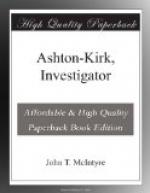He crossed his legs and pursed up his lips.
“If you don’t mind,” added he, “now that I have expressed myself, I’ll listen to the details of whatever you have in view.”
“There is not a great deal to tell,” said Ashton-Kirk. “A man has been murdered in Christie Place. It happens that I have an interest in the matter; otherwise I would not think of dipping into it.”
Pendleton looked at him reproachfully.
“After all, then,” exclaimed he, “you are but a dilettante! Assassination in the abstract is well enough, but you have a disposition to shirk practical examples. I have been deceived!”
Christie Place was some distance west and ran off from a much frequented street. It was notable for the wilderness of sign boards that flared from each side. The buildings were apparently let out in floors and each lessee endeavored to outdo his neighbor in proclaiming his business to the passing public. The lower floors were, for the most part, occupied by small grocers, dealers in notions, barbers, confectioners and such like.
“What a crowded, narrow little place,” commented Pendleton, as the car turned into the street. The air in the street seemed to him heavy.
About midway in the block a small group stood about a doorway; from a window above swung a sign bearing the name of Hume. The car stopped here; Ashton-Kirk and his friend got out; the group at the doorway parted and a big man stepped forward.
“Why, hello,” said he, cordially. “You’re the last person I was looking for. How did you hear about this?”
“Good morning, Osborne,” said Ashton-Kirk, shaking the big man’s hand. “I’m glad to find you in charge. I got it in an unusual sort of way, and came down to have a look.”
Osborne, though in plain clothes, was emphatically a policeman. His square face, his big frame, his dogged expression, somehow conveyed the impression as plainly as words.
“It must have been unusual,” said he, “because even the reporters haven’t got it yet; headquarters is keeping it quiet until the chief gets in.”
Ashton-Kirk looked vastly pleased.
“Excellent,” said he to Pendleton. “We’ll have a look at the place before it has lost the atmosphere of the crime.” Then to Osborne: “May we go up?”
“Sure,” answered the other readily. “Only don’t pull things around any. That young fellow that they’ve elected coroner is awful touchy about such things. He wants to be first always.”
“Nothing of importance shall be disturbed,” promised Ashton-Kirk. Then motioning Pendleton to follow, he ascended the flight that led to the second floor.
It was narrow and dusty, as Miss Vale had said. The walls were smutted, the hand rail felt greasy, the air was stale. A passage, dim and windowless, ran the depth of the building; from the front there came a patch of daylight through a ground glass door. Upon this latter could be easily read the words:




